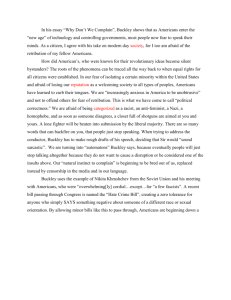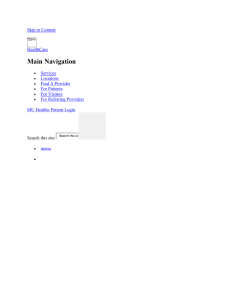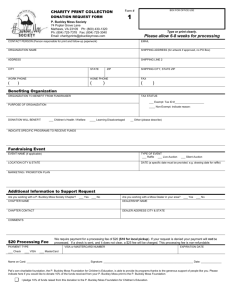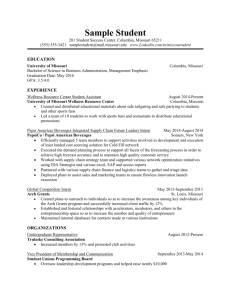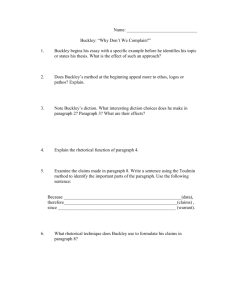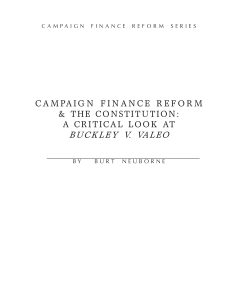Nixon v. Shrink Missouri Government PAC
advertisement
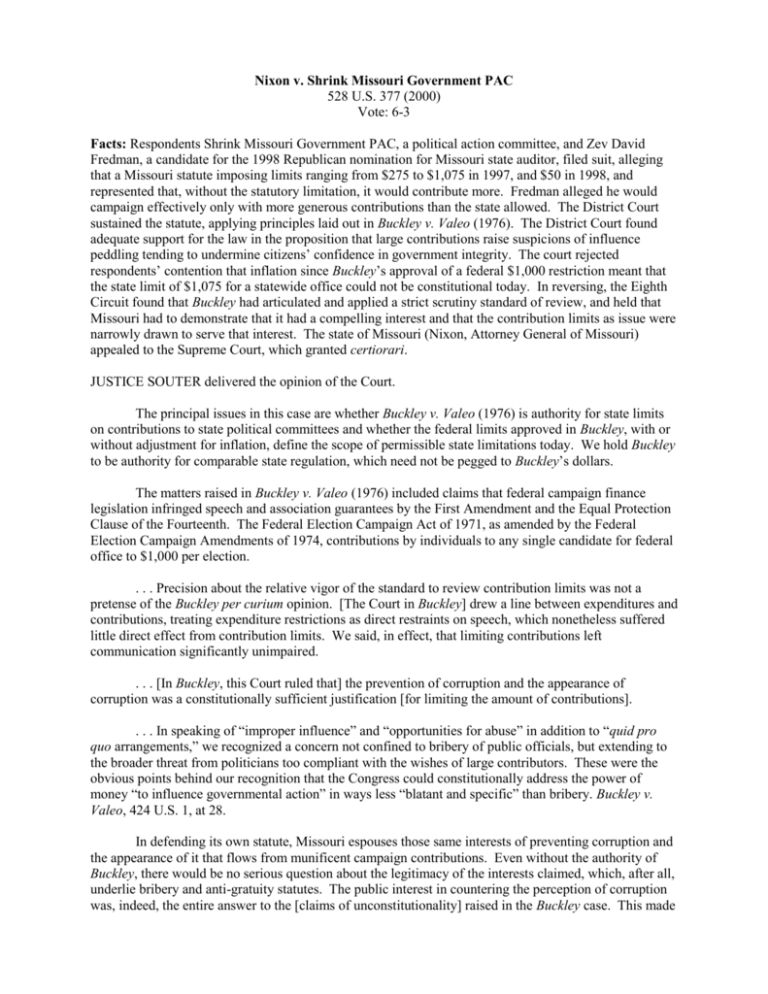
Nixon v. Shrink Missouri Government PAC 528 U.S. 377 (2000) Vote: 6-3 Facts: Respondents Shrink Missouri Government PAC, a political action committee, and Zev David Fredman, a candidate for the 1998 Republican nomination for Missouri state auditor, filed suit, alleging that a Missouri statute imposing limits ranging from $275 to $1,075 in 1997, and $50 in 1998, and represented that, without the statutory limitation, it would contribute more. Fredman alleged he would campaign effectively only with more generous contributions than the state allowed. The District Court sustained the statute, applying principles laid out in Buckley v. Valeo (1976). The District Court found adequate support for the law in the proposition that large contributions raise suspicions of influence peddling tending to undermine citizens’ confidence in government integrity. The court rejected respondents’ contention that inflation since Buckley’s approval of a federal $1,000 restriction meant that the state limit of $1,075 for a statewide office could not be constitutional today. In reversing, the Eighth Circuit found that Buckley had articulated and applied a strict scrutiny standard of review, and held that Missouri had to demonstrate that it had a compelling interest and that the contribution limits as issue were narrowly drawn to serve that interest. The state of Missouri (Nixon, Attorney General of Missouri) appealed to the Supreme Court, which granted certiorari. JUSTICE SOUTER delivered the opinion of the Court. The principal issues in this case are whether Buckley v. Valeo (1976) is authority for state limits on contributions to state political committees and whether the federal limits approved in Buckley, with or without adjustment for inflation, define the scope of permissible state limitations today. We hold Buckley to be authority for comparable state regulation, which need not be pegged to Buckley’s dollars. The matters raised in Buckley v. Valeo (1976) included claims that federal campaign finance legislation infringed speech and association guarantees by the First Amendment and the Equal Protection Clause of the Fourteenth. The Federal Election Campaign Act of 1971, as amended by the Federal Election Campaign Amendments of 1974, contributions by individuals to any single candidate for federal office to $1,000 per election. . . . Precision about the relative vigor of the standard to review contribution limits was not a pretense of the Buckley per curium opinion. [The Court in Buckley] drew a line between expenditures and contributions, treating expenditure restrictions as direct restraints on speech, which nonetheless suffered little direct effect from contribution limits. We said, in effect, that limiting contributions left communication significantly unimpaired. . . . [In Buckley, this Court ruled that] the prevention of corruption and the appearance of corruption was a constitutionally sufficient justification [for limiting the amount of contributions]. . . . In speaking of “improper influence” and “opportunities for abuse” in addition to “quid pro quo arrangements,” we recognized a concern not confined to bribery of public officials, but extending to the broader threat from politicians too compliant with the wishes of large contributors. These were the obvious points behind our recognition that the Congress could constitutionally address the power of money “to influence governmental action” in ways less “blatant and specific” than bribery. Buckley v. Valeo, 424 U.S. 1, at 28. In defending its own statute, Missouri espouses those same interests of preventing corruption and the appearance of it that flows from munificent campaign contributions. Even without the authority of Buckley, there would be no serious question about the legitimacy of the interests claimed, which, after all, underlie bribery and anti-gratuity statutes. The public interest in countering the perception of corruption was, indeed, the entire answer to the [claims of unconstitutionality] raised in the Buckley case. This made perfect sense. Leave the perception of impropriety unanswered, and the cynical assumption that large donors call the tune could jeopardize the willingness of voters to take part in democratic governance. . . . [T] his case does not present a close call requiring further definition of whatever the State’s evidentiary obligation may be. While the record does not show that the Missouri Legislature relied on the evidence and findings accepted in Buckley, the evidence introduced into the record by respondents or cited by the lower courts in this action is enough to show that the substantiation of the congressional concerns reflected in Buckley has its counterpart supporting the Missouri Law. [T] he State presented an affidavit from State Senator Wayne Goode . . .who stated that large contributions have “the real potential to buy votes.” The District Court cited newspaper accounts of large contributions supporting inferences of impropriety. One report questioned the state treasurer’s decision to use a certain bank for most of Missouri’s banking business after that institution contributed $20,000 to the treasurer’s campaign. . . . [F]urthermore, “an overwhelming 74 percent of the voters of Missouri determined that contribution limits are necessary to combat corruption and the appearance thereof.” Carver v. Nixon, 882 F.Supp. 901, 905 (WD Mo.). . . .There is no reason in logic or evidence to doubt the sufficiency of Buckley to govern this case in support of the Missouri statute. The judgment of the Court of Appeals is, accordingly, reversed. [Note: It is standard for dissenting opinions to follow the majority and concurring opinions but because Justice Breyer refers to the dissenting opinions, we have included some pieces from the dissenting opinions of Justice Kennedy and Justice Thomas for context in reading Justice Breyer’s concurring opinion.] JUSTICE KENNEDY, dissenting The Court’s decision has lasting consequences for political speech in the course of elections, the speech upon which democracy depends. Yet in defining the controlling standard of review and applying it to the urgent claim presented, the Court seems almost indifferent. Its analysis would not be acceptable for the routine case of a single protester with a hand-scrawled sign, see City of Ladue v. Gilleo, 512 U.S. 43 (1994), a few demonstrations on a public sidewalk, see United States v. Grace, 461 U.S. 171 (1983), or a driver who taped over the lotto on his license plate because he disagreed with its message, see Wooley v. Maynard, 430 U.S. 705 (1977). Surely the Court’s approach is unacceptable for a case announcing a rule that suppresses one of our most essential and prevalent forms of political speech. . . .[T] he Court abandon[s] the rigors of our traditional First Amendment structure. . . .Our First Amendment principles surely tell us that an interest thought to be the compelling reason for enacting a law is case into grave doubt when a worse evil surfaces in the law’s actual operation. And our obligation to examine the operation of the law is all the more urgent when the new evil is itself a distortion of speech. By these measures the law before us cannot pass any serious standard of First Amendment review. JUSTICE THOMAS, with whom JUSTICE SCALIA joins, dissenting . . .I would subject campaign contribution limitations to strict scrutiny, under which Missouri’s contribution limits are patently unconstitutional. I begin with a proposition that ought to be unassailable: Political speech is the primary object of First Amendment protection. The Founders sought to protect the rights of individuals to engage in political speech because a self-governing people depends upon the free exchange of political information. And that free exchange should receive the most protection when it matters the most –during campaigns for elective office. JUSTICE BREYER, with whom JUSTICE GINSBURG joins, CONCURRING. The dissenters accuse the Court of weakening the First Amendment. They believe that failing to adopt a “strict scrutiny” standard “balance[s] away First Amendment freedoms.” (opinion of Justice THOMAS). But the principal dissent oversimplifies the problem faced in the campaign finance context. It takes a difficult constitutional problem and turns it into a lopsided dispute between political expression and government censorship. Under the cover of this fiction and its accompanying formula, the dissent would make the Court absolute arbiter of a difficult question best left, in the main, to the political branches. I write separately to address the critical question of how the Court ought to review this kind of problem, and to explain why I believe the Court’s choice here is correct. If the dissent believes that the Court diminishes the importance of the First Amendment interests before us, it is wrong. The Court’s opinion does not question the constitutional importance of political speech or that its protection lies at the heart of the First Amendment. Nor does it question the need for particularly careful, precise, and independent judicial review where, as here, that reason there is no place for a strong presumption against constitutionality, of the sort often thought to accompany the words “strict scrutiny.” Nor can we expect that mechanical application of the tests associated with “strict scrutiny” – the tests of “compelling interests” and “least restrictive means” – will properly resolve the difficult constitutional problem that campaign finance statutes pose. On the one hand, a decision to contribute money to a campaign is a matter of First Amendment concern – not because money is speech (it is not); but because it enables speech. Through contributions the contributor associates himself with the candidate’s cause, helps the candidate communicate a political message with which the contributor agrees, and helps the candidate win by attracting the votes of similarly minded voters. Both political association and political communication are at stake. On the other hand, restrictions upon the amount of money any one individual can contribute to a particular candidate seek to protect the integrity of the electoral process – the means through which a free society democratically translates political speech into concrete governmental action. Moreover, by limiting the size of the largest contributions, such restrictions aim to democratize the influence that money itself may bring to bear upon the electoral process. In doing so, they seek to build public confidence in that process and broaden the base of a candidate’s meaningful financial support, encouraging the public participation and open discussion that the First Amendment itself presupposes. In service of these objectives, the statute imposes restrictions of degree. It does not deny the contributor the opportunity to associate with the candidate through a contribution, though it limits a contribution’s size. Nor does it prevent the contributor from using money (along or with others) to pay for the expression of the same views in other ways. Instead, it permits all supporters to contribute the same amount of money, in an attempt to make the process fairer and more democratic. . . .I would uphold the statute essentially for the reasons stated by the Court. I agree that the legislature understands the problem – the threat to electoral integrity, the need for democratization – better than we do. We should defer to its political judgment that unlimited spending threatens the integrity of the electoral process.

